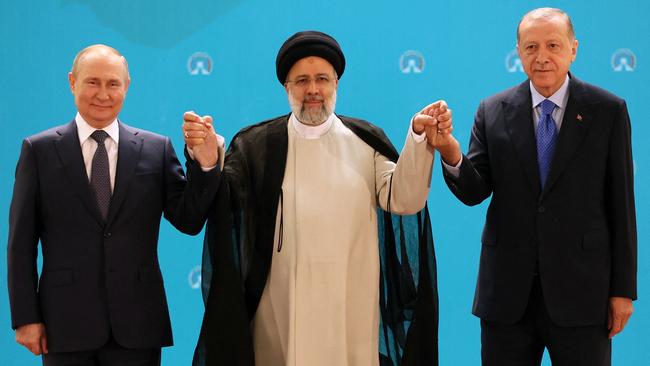Putin’s trip to Tehran aims to boost ties with Iran, Turkey
The three leaders discussed a range of issues, from the wars in Syria and Ukraine to vital grain exports via the Black Sea.

Russian President Vladimir Putin held talks with the leaders of Iran and Turkey overnight Tuesday in a trip intended to demonstrate his continued international influence during the invasion of Ukraine.
The summit with Turkey’s President Recep Tayyip Erdogan and Iran’s President Ebrahim Raisi in Tehran nominally focused on peace talks in the war in Syria, but the conversation among the three leaders was overshadowed by the crisis in Ukraine.
Mr Putin used the trip to shore up friendly relations with both Iran and Turkey, and to push back on the international isolation imposed on him by the US and Western allies.
The three leaders gathered overnight Tuesday around a vast round table, trading prepared statements about the situation in Syria. Earlier in the day, the agenda for a series of separate meetings included discussions on security, Turkish involvement in the war in Ukraine, and a UN-backed proposal to resume exports of vital Ukrainian grain supplies via the Black Sea.
Mr Putin said after the talks that the West must remove restrictions on exports of Russian grain. “We will facilitate the export of Ukrainian grain, but we are proceeding from the fact that all restrictions related to air deliveries for the export of Russian grain will be lifted,” he said.
Russian, Ukrainian and Turkish negotiators reached agreement on the broad outlines of a plan to ship the grain, which has been trapped in the country in part by mines laid by both Ukraine and Russia.
Russia and Iran also agreed to deepen co-operation on energy, signing a $US40bn memorandum of understanding for oil-and-gas projects on Tuesday.
Mr Putin’s trip comes days after US President Joe Biden’s visit to the region last week in which he sought to rally Middle East nations against China and Russia in a broader confrontation among world powers resulting from the attack on Ukraine.
“It’s the definition of pushback,” said Ali Vaez, the Iran project director of the International Crisis Group. “They now share a vision of a coalition of sanctioned states, comprised of countries like Iran, Russia, China, Venezuela.”
The trip is only the second time Mr Putin has left Russia since he ordered the invasion of Ukraine in February, and his first foray outside his immediate sphere of influence, following a visit to the small Central Asian country of Tajikistan in June.
“Our relations are developing at a good pace,” Mr Putin said at the start of his meeting with Mr Raisi. “We are strengthening our co-operation on international security issues, making a significant contribution to the settlement of the Syrian conflict.”
Mr Putin also met Iran’s Supreme Leader Ali Khamenei, part of a visit intended to deepen ties with one of Russia’s closest partners in the region. The two countries both back the regime of Bashar al-Assad in Syria and are both the target of US sanctions. Earlier Tuesday, Mr Erdogan held talks with Mr Raisi and Ayatollah Khamenei.
The invasion of Ukraine and resulting Western sanctions have drawn Russia and Iran closer together. Russian and Iranian officials say the two countries are hoping to extend economic ties, despite them being energy exporters competing for market share with their buyer, China.
It follows years in which Russia has carefully cultivated relations with a range of Middle Eastern nations, including opponents of the West and traditional US security partners such as Saudi Arabia, Egypt and Turkey, preying on fears of Washington scaling back its commitment to the region.
“Putin is a vulture in this regard. He is able to exert outsized influence compared to the size of Russia’s economy and its actual power by feeding off the insecurity of nations,” said Natasha Hall, a senior fellow with the Middle East Program at the Centre for Strategic and International Studies in Washington.
Mr Putin was also expected to discuss security ties with Iran. The Iranian government is planning to provide Russia with armed drones, US National Security Adviser Jake Sullivan said this month, citing American intelligence. Iran denied the accusation. Kremlin aide Yury Ushakov said that Mr Putin didn’t discuss drone purchases with either Mr Raisi or Mr Khamenei on Tuesday.
The summit is also an official meeting of the so-called Astana forma negotiations over Syria, a diplomatic process launched in 2017 between Turkey, Russia and Iran. Mr Erdogan renewed threats to launch a new incursion against Kurdish militants in northern Syria, an operation that would further destabilise Syria while possibly displacing tens of thousands of people. Any such attack by Turkey would likely require Moscow’s approval due to the presence of Russian troops in the area. Mr Erdogan said a new operation was necessary to clear two areas of Syria of what he called terrorists. Iran, whose own forces are also deeply involved in the Syrian conflict, warned against a new Turkish military operation in Syria. Ayattolah Khamenei told Mr Erdogan during their meeting, “Any military attack in north Syria will definitely be a detriment to Turkey, Syria and the entire region,” he said.
The World Street Journal



To join the conversation, please log in. Don't have an account? Register
Join the conversation, you are commenting as Logout